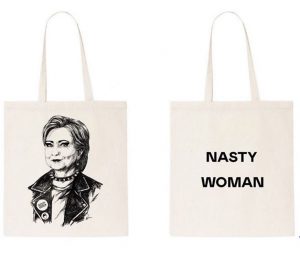
Donald Trump’s “nasty woman” comment during the third presidential debate has ignited a veritable “nasty woman economy.” Just two weeks later, there are numerous hashtags and a growing diversity of merchandise, including a tote bag, that reclaim “nasty woman” as a positive and empowering label. Elizabeth Warren capitalized on this at a recent Clinton rally when she said, “nasty women are tough, nasty women are smart, and nasty women vote.” As The Atlantic details in their feminist history of the word, “nasty” was reappropriated as a “badge of honor” some time ago, and they point to songs like Janet Jackson’s Nasty as an example of women using the word in a positive way. The reappropriation of stigmatized labels is not new, though social scientists find that this strategy has both strengths and weaknesses.
Psychologists have found that when a group reclaims a derogatory label, perceptions of that group’s power increases. And once a group is perceived as powerful, individuals feel more empowered to self identify with that reappropriated label. However, this strategy only works for derogatory terms like “queer” and “bitch,” not for descriptive terms like “woman” or majority-group terms like “straight.”
- Adam D. Galinsky et al. 2013. “The Reappropriation of Stigmatizing Labels: The Reciprocal Relationship Between Power and Self-Labeling.” Psychological Science 24(10): 2020–2029.
Some sociologists argue that this power is merely a “false power.” The fact that terms like “bitch” are still sometimes used as derogatory terms, often by the very people who claim to be reappropriating them for good, leads some to the conclusion that reclaiming terms in this way only hides oppression by making it acceptable and keeping the term alive in the lexicon. Scholars like Mariam Frasier also point out that class, race, and gender inequality shapes if and when someone can identify with a reappropriated label.
- Sherryl Kleinman, Matthew Ezzell, and Corey Frost. 2009. “Reclaiming Critical Analysis: The Social Harms of ‘Bitch’” Sociological Analysis 3(1): 46-68.
- Mariam Fraser. 1999. “Classing Queer: Politics in Competition.” Theory, Culture & Society 16(2): 107-131.
This contested and often flexible nature of reappropriated labels is what others see as their strength. Generational and political differences often result in conflicts surrounding reappropriation of a term. These debates have been found among many groups, including feminists, atheists, and African Americans. But some social scientists argue that these negotiations and disagreements give members of stigmatized social groups the agency to evaluate their own labels and to make determinations about when and whether to accept or reject them on their own terms.
- Jo Reger. 2015. “The Story of a Slut Walk: Sexuality, Race, and Generational Divisions in Contemporary Feminist Activism.” Journal of Contemporary Ethnography 44(1): 84–11.
- Jacquelyn Rahman. 2012. “The N Word: Its History and Use in the African American Community.” Journal of English Linguistics 40(2): 137–171.
- Steven Kettell. 2014. “Divided We Stand: The Politics of the Atheist Movement in the United States.” Journal of Contemporary Religion 29(3): 377-391.

Comments